Students life
Please, welcome our two interviews with international students making their MSc and PhD in Veszprém.
An interview with Yusufbek Sulaymonov – a graduating student from Uzbekistan
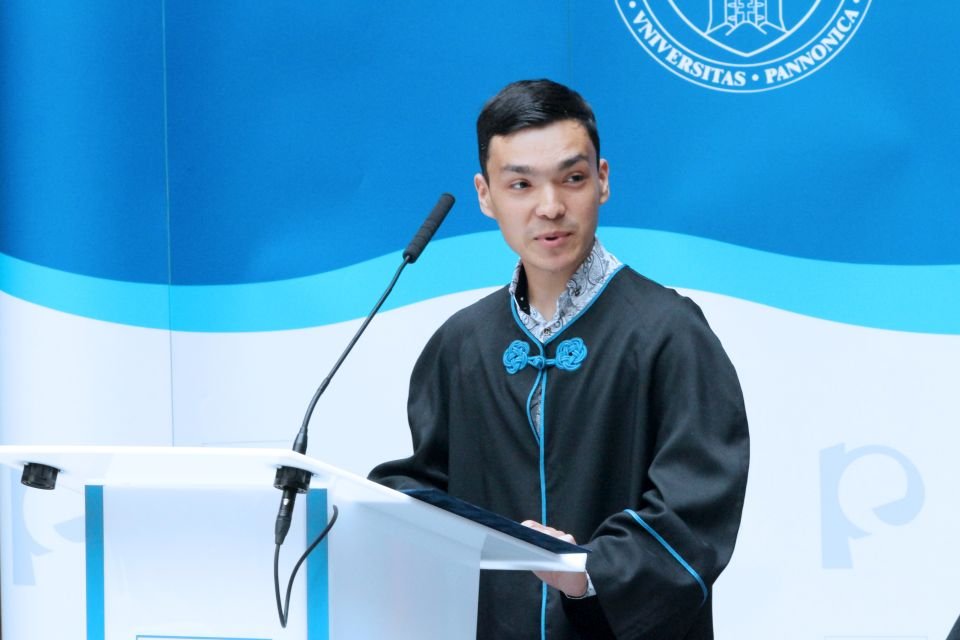
Questioner: Can you tell us some words about your background?
Yusuf: I came from Uzbekistan, a beautiful country located in the middle of Central Asia. My hometown is called Andijan, it is the smallest industrial town but the largest by population. I got my bachelor education in Uzbekistan and came to Hungary to do my masters in 2021. It was my first ever travel to abroad.
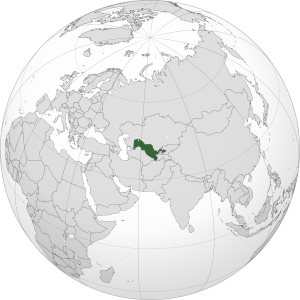
(Image licensed under the Creative Commons Attribution-Share Alike 4.0 International license. Source: M.Bitton)
Questioner: Why did you choose Hungary and the University of Pannonia to begin your higher education? What was the decisive factor?
Yusuf: First and foremost, I was drawn to Hungary because of its rich cultural heritage, central European location, and its reputation as a hub for academic excellence. Hungary has a long history of producing world-class scholars, and I wanted to be part of this vibrant academic community.
The University of Pannonia, in particular, stood out due to its high-quality academic staff and research opportunities. The faculty members were not only experts in their respective fields but also approachable and supportive mentors. This was crucial for me as I sought a nurturing environment that would foster my academic growth. One of the decisive factors was the abundance of research opportunities available at the University of Pannonia. The institution was known for its active involvement in cutting-edge research projects across various disciplines. This appealed to me greatly, as I was keen on gaining practical research experience alongside my academic studies.
Questioner: How did you know about the University of Pannonia?
Yusuf: During my search for suitable universities, I came across the University of Pannonia while browsing through international university educational websites. Additionally, I reached out to current or former students who had experiences at various universities.
Questioner: What out of classroom support is there at the university?
Yusuf: The university emphasized collaborative learning through group projects and teamwork. This not only helped me integrate into the academic community but also provided opportunities to work with peers from different cultural backgrounds, enhancing my interpersonal and problem-solving skills as well as the university offered a mentorship program, where incoming international students were paired with senior students or mentors who were familiar with the academic system, campus life, and the local culture. These mentors were instrumental in helping newcomers adjust to university life, providing guidance on course selection, and offering insights into the local community.
Questioner: What programme do you study? Which courses did you like the most and why?
Yusuf: In my MSc in Computer Science program, I had the opportunity to explore a wide range of courses that contributed to my overall understanding of the field. Among these, a few courses stood out as my favorites: Software Engineering and Project Management: This course was not just about coding but also about the entire software development lifecycle. I enjoyed learning about project management methodologies like Agile and Scrum, as well as the importance of writing clean, maintainable code. It provided a holistic view of software development. Computer Security and Ethical Hacking: This course was both exciting and eye-opening, as it taught me about various security threats, penetration testing, and ethical hacking techniques. Understanding how to protect systems and data was both practical and relevant. Each of these courses had its unique appeal, but what made them my favorites was their real-world applicability and the opportunity to tackle challenging problems. They not only expanded my knowledge but also prepared me for a rewarding career in the dynamic field of computer science.
Questioner: What was your first impression of Veszprém city and social activities of the University?
Yusuf: My first impression of Veszprém, the city where I pursued my higher education, was overwhelmingly positive. Veszprém exuded a warm and welcoming atmosphere that made it feel like a second home. The city had a close-knit community, and this sense of togetherness extended to the university as well. The university's community felt like a family, and this was particularly comforting for international students who were far from home. Veszprém's smaller size had its advantages. It was easy to navigate, and everything was within reach. The city had a relaxed pace of life, making it conducive to studying and enjoying a stress-free environment. Additionally, the natural beauty of the surrounding area, with Lake Balaton nearby, offered opportunities for outdoor activities and relaxation.
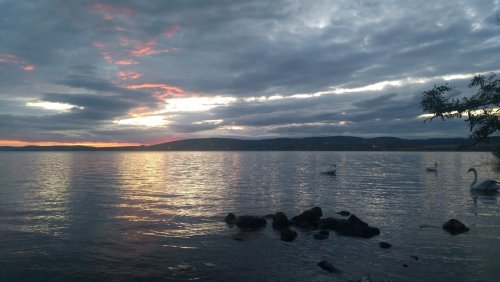
Lake Balaton
Questioner: Was it easy to find friends?
Yusuf: Yes, it was. The University had a diverse international student body, creating an enriching and cosmopolitan environment. This diversity was reflected in the social activities organized by the university, where students from various backgrounds came together to celebrate their cultures and share their experiences. It was an excellent opportunity to learn about different cultures and make friends from around the world.
Questioner: What recommendation or advice can you give to those who would like to apply for Master's studies at the University of Pannonia?
Yusuf: Start by thoroughly researching the Master's programs offered by the University of Pannonia. Understand the program's curriculum, specializations, and prerequisites. Ensure that the program aligns with your academic and career goals.
Don't wait until the last minute to submit your application. Applying early gives you ample time to address any issues that may arise during the application process. Keep track of all application deadlines, requirements, and communications with the university. Create a checklist to ensure you've completed all necessary steps.
Questioner: Was it easy to submit the application?
Yusuf: The ease of submitting an application to the University of Pannonia, like any university, can vary depending on your preparedness and familiarity with the application process. For me it was quite easy, thus as a Stipendium Hungaricum alumni I applied via Dream Apply Portal and provided documents that reflects academic background, language proficiency. If your application is successfully passed from the first round of checking, you will be invited to interview with academic staff of university for the final round of selection.
Questioner: How is the accommodation?
Yusuf: The accommodation options are generally well-regarded, offering a range of choices to suit different preferences and budgets. I stayed in Hostel Magister. Facilities are usually well-maintained and provide essential amenities for comfortable living. You can expect furnished rooms with basic furniture, including a bed, desk, and wardrobe. There are also common rooms where residents can socialize, study, or relax.
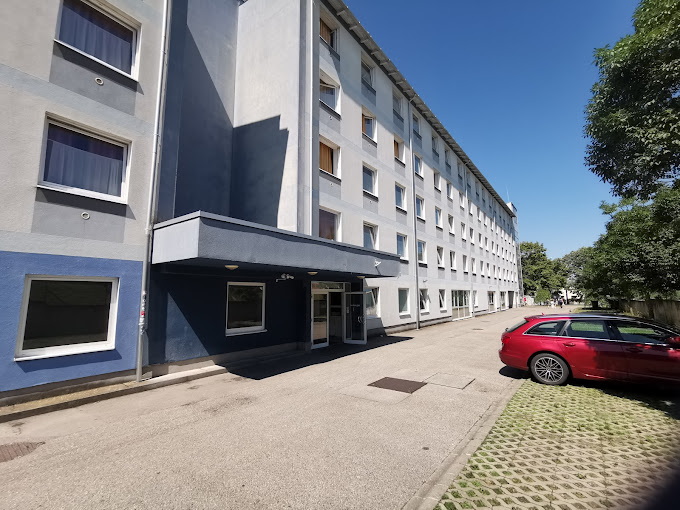
Hotel Magister
Questioner: How have you found the workload of the courses? Have you encountered any challenges?
Yusuf: The courses are designed to provide a comprehensive and in-depth understanding of the subject matter, which often requires a significant amount of time and effort. One of the challenges I've encountered is managing my time effectively. Balancing coursework, assignments, and other responsibilities can be demanding, especially during peak periods like midterm exams and project deadlines.
Questioner: What is your favorite memory at the uni so far?
Yusuf: One of my fondest memories at the University of Pannonia was when I had the incredible opportunity to participate in the cultural show called 'Taste of Pannonia.' During this event, I had the chance to showcase my traditional food, 'Palov,' to a diverse and appreciative audience. Preparing for the event was a labor of love. I wanted to ensure that 'Palov,' a cherished dish from my home culture, was not only delicious but also authentically representative. I spent hours perfecting the recipe and even received guidance from family members to ensure it was just right.
The Faculty of Information Technology thanks for this interview, being part of our community, and wishes Yusuf a successfull carieer wherever Yusuf decides to go in his life!
Interview with Amr Nagy (Egypt)
Amr Nagy, our former Stipendium Hungaricum student, defended his PhD thesis in December 2022 with Summa Cum Laude qualification at the Faculty of Information Technologies. He has already returned to his home country Egypt, however, his relations with the University are still alive. Here you can read a short interview with him about his experiences in Veszprém.
Questioner: Dear Amr, why did you choose the University of Pannonia for your PhD studies?
Amr: As I work at a University in Egypt, found it a good idea to get the PhD somewhere in Europe. When I was searching on the Internet, I found that the University of Pannonia contains many internationally recognized and highly appreciated professors, and it looked that they are always developing their academic environment. In addition to, the University of Pannonia has a good history and is located in the beautiful historic town Veszprem. So, I thought it was a perfect starting point for exploring Hungary and Europe.
Q: How was the application process?
Amr: Well, it was not a complicated process. It started with an announcement about the scholarship call (I think it was between November and January). Then, the accepted applications went to the second round (the interview step). Finally, the results for the accepted scholars were announced between June and July. I was happy to get the scholarship, since my personal carrier really needed the PhD to work at a University.
Q: How flexible was your study plan, and how long did the program run?
Amr: During my “PhD journey”, I could choose between different subjects which were related to my research interest. The whole program started in September 2018 and ended in December 2022. During my research work, I had regular consultations (typically several times a week) with my supervisor and each semester I should prepare a report about my research progress. The research plan was somewhat flexible, since research outcome is never exactly how we think before, and also the publication requirements should have been satisfied in time.

Q: In your opinion, what advantage does a PhD degree holder have in the job market or in your future career?
Amr: I think PhD holders have many advantages in many ways: a PhD makes a candidate very attractive to employers looking to fill higher-level, research driven positions, and in certain sectors, like science and finance, PhD holders can look forward to a significantly higher earning potential than masters and bachelor’s graduates. As the society is transforming to a knowledge-based culture, there is a natural need for highly skilled, experienced experts also on the theoretical field.
Q: What do you like the most about your PhD studies?
Amr: In Veszprém I learned how to make research in general and I also learned a lot of technical information on my field of interest. I also met some great people along my way.
Q: It is a few months that you returned to Egypt. What happened since then?
Amr: I’m working now at the University of Benha. I feel my PhD degree and my learnt experiences can open up new lines for my field and I can use it as the foundation for a fruitful research career. For example, I can start to work with my students at a much professional level. Moreover, we are working on some topics together with colleagues in Veszprém.
Q: Do you have a family; how did you organize your staying here?
Amr: Yes, I am happy to have a wife and three sons. We rented a flat in Veszprem city. It was at a nice, friendly location and within walking distance to the University. In general, to find an accommodation for foreign people is not an easy process, especially if you have a family with you. Moreover, the cost of rent is expensive if you compare to the salary. A large portion went to rent and utilities. On the other side education was not expensive. My older sun even started the elementary school in Veszprém and they also attended the local kindergarten. All were in short distances, their studies were great and without difficulties. I would like to thank the Botev school for its good educational system.
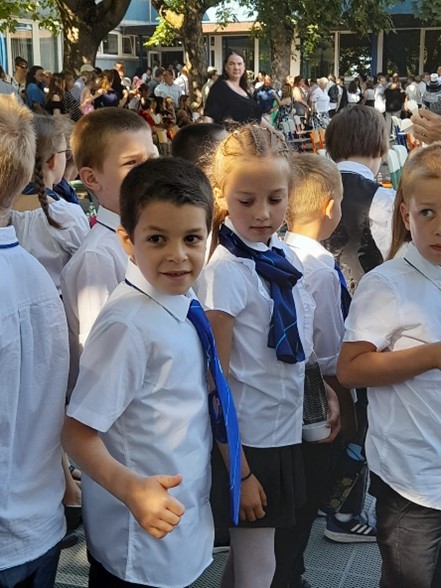
Q: What were the main cultural differences to your home country that you experienced personally?
Amr: There are a number of differences, the one I am most aware of is the difference in thinking. Hungarians love reading everywhere on bus, train, beach…, and the number of people who enjoy reading is larger than in Egypt. Hungarians tend to be individual and rational, similarly to other Europeans, whereas my country is more socially driven. Most Egyptian families have higher number of members if we compare them to Hungarian families.
Q: Could you visit other cities, regions, natural areas of Hungary or Europe?
Amr: I am happy that we could visit different cities: in Hungary maybe we enjoyed Budapest, Balatonfüred and Siófok the most, but visiting Venice (Italy) was very exciting too.
Q: Which Hungarian food you liked/disliked the most?
Amr: I follow halal diet, so there were couple of foods I did not try. The traditional Hungarian food lángos I liked very much.
Q: Dear Amr, we are very happy that your staying here was successful, thank you for the interview.
Amr: Finally, I would like to finish my talk by saying that being in Veszprém was a good and memorable period in my life and also for my family. I could say that me and my family enjoyed everywhere in Hungary and Europe. Additionally, my older son is always asking me to visit Hungary again.


